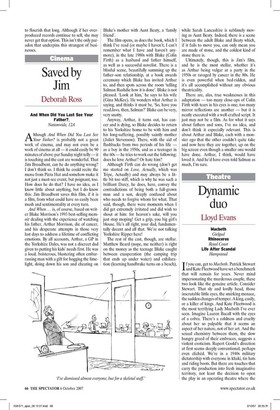Saved by Jim
Deborah Ross And When Did You Last See Your Father?, Nationwide, 12A Although And When Did You Last See Your Father? is probably not a great work of cinema, and may not even be a work of cinema at all — it could easily be 90 minutes of above-par Sunday night telly — it is touching and the cast are wonderful. That Jim Broadbent, can he do anything wrong? I don't think so. I think he could recite the menu from Pizza Hut and somehow make it not just a must-see event, but poignant, too. How does he do that? I have no idea, as I know little about anything, but I do know this: Jim Broadbent saves this film, if it is a film, from what could have so easily been mush and sentimentality at every turn.
And When . . . is, of course, based on writer Blake Morrison's 1993 best-selling memoir dealing with the experience of watching his father, Arthur Morrison, die of cancer, and his desperate attempts in those very last days to address a lifetime of conflicting emotions. By all accounts, Arthur, a GP in the Yorkshire Dales, was not a discreet dad given to putting his kids' needs first. He was a loud, boisterous, blustering often embarrassing man with a gift for hogging the limelight, doing down his son and cheating on Blake's mother with Aunt Beaty, a 'family friend'.
The film opens, as does the book, which I think I've read (or maybe I haven't; I can't remember what I have and haven't anymore), in the late 1980s with Blake (Cohn Firth) as a husband and father himself, as well as a successful novelist. There is a blissful scene, beautifully summing up the father–son relationship, at a book awards ceremony which Blake has invited Arthur to, and then spots across the room 'telling Salman Rushdie how it is done'. Blake is not pleased. 'Look at him,' he says to his wife (Gina McKee). He wonders what Arthur is saying, and thinks it must be, 'So, have you read Jaws, then, Salman?' Blake can be very, very snotty.
Anyway, Arthur, it turns out, has cancer and is dying, so Blake decides to return to his Yorkshire home to be with him and his long-suffering, possibly saintly mother (Juliet Stevenson). There, with the aid of flashbacks from two periods of his life — as a boy in the 1950s, and as a teenager in the 60s — he tries to work out the following: does he love Arthur? Or hate him?
Although Firth can do wrong (don't get me started on Love, Actually, which was Tripe, Actually) and may always be a little bit too stiff, which is why he was such a brilliant Darcy, he does, here, convey the contradictions of being both a full-grown man and a son, deeply confused about who needs to forgive whom for what. That said, though, there were moments when I did get extremely irritated and did wish to shout at him for heaven's sake, will you just stop moping! Get a grip, you big girl's blouse. He's all right, your dad, fundamen tally decent and all that. We're not talking Yorkshire Ripper here!
The rest of the cast, though, are stellar. Matthew Beard (nope, me neither) is right on the money as the teenage Blake caught between exasperation (the camping trip that ends up under water) and exhilaration (learning handbrake turns on a beach), while Sarah Lancashire is sublimely moving as Aunt Beaty. Indeed, there is a scene between the adult Blake and Beaty which, if it fails to move you, can only mean you are made of stone, and the coldest kind of stone there is.
Ultimately, though, this is Jim's film, and he is the most stellar, whether it's as Arthur being vulgar at a party in the 1950s or ravaged by cancer in the 80s. He is even powerful when bed-ridden, and it's all accomplished without any obvious theatricality.
There are, alas, true weaknesses in this adaptation — too many close-ups of Colin Firth with tears in his eyes is one; too many mirror reflections are another — but it is neatly executed with a well-crafted script. It just may not be a film. As for what it says about fathers and sons, I've no idea, and don't think it especially relevant. This is about Arthur and Blake, each with a monster ego that the other couldn't quite take and now here they are together, up on the big screen even though a smaller one would have done. Arthur, I think, would have loved it. And he'd have even told Salman as much, I'm sure.





























































 Previous page
Previous page